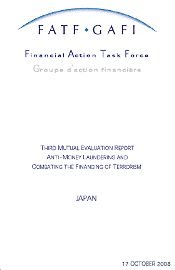The Financial Action Task Force (FATF) and the Asia-Pacific Group on Money Laundering (APG) have jointly assessed the anti-money laundering and counter-terrorist financing measures of Japan for compliance with the FATF standards. Among the major findings of the report were:
- Japan has, overall, a good legal structure to combat money laundering (ML) and terrorist financing (TF). The ML offence is broad and meets the FATF’s requirements. However the number of prosecutions remains low compared to the drug consumption and organised crime problems in Japan. The TF offence does not cover funds collection by non-terrorists and it is unclear in the law whether indirect funds provision and collection are covered and that funds provision and collection for any other purpose than committing terrorist acts is criminalized. In addition, the offence is limited to “funds” and does not cover any other financial and non-financial assets.
- Japan has established a comprehensive and effective mechanism to confiscate, freeze and seize the proceeds of crime; however the regime does not appear to be fully and effectively implemented. As to the freezing of terrorist assets, a system based on a licensing system prior to carrying out certain transactions has been implemented. This system does not cover the potential for domestic funds being made available, unless attempted transactions in foreign currency, with a non-resident in Japan, or overseas transactions are undertaken. Nor does it cover other support by residents for listed terrorist entities and individuals. This system does not allow Japan to freeze terrorist assets without delay. In addition, the freezing system is limited to “funds” and does not cover every kind of asset.
- Japan’s FIU was transferred from the Financial Services Agency to the National Police Agency in April 2007 and became the Japan Financial Intelligence Centre (JAFIC). JAFIC receives a constantly increasing number of STRs and has good access to law enforcement and other information to undertake analysis as well as sound information technology. However, more analysis should be done and the FIU’s number of analytical staff should be increased. Since March 2008, an electronic reporting system has been implemented. The main law enforcement bodies involved in the fight against ML/TF are the Prefectural Police and the Public Prosecutor’s Office. Both are responsible for AML/CFT investigations and have adequate powers.
- The preventive system, which applies to a full range of financial institutions and designated non-financial businesses and professions, only addresses customer identification. It is strongly recommended that Japan fully implement the CDD obligations and the requirement to establish adequate internal control. The STR system is strong; however it is recommended that Japan implement a separate mechanism to monitor of transactions and relationships. In addition, it appears that sectors other than the banking sector have filed an extremely limited number of STRs.
- Supervisory authorities are properly resourced, staffed, trained and have adequate powers to monitor and ensure compliance by financial institutions. However, there are concerns with the low number of inspections carried out in financial institutions other than banks, insurance and securities, the limited number and type of sanctions applied, and the dissuasive nature of the criminal monetary penalties is doubtful.
- Japan had signed, at the time of the onsite visit, treaties with Korea and the United States on mutual legal assistance and extradition. Therefore, the most utilised means in both matters are the relevant Japanese laws, which set strict conditions to provide assistance and grant extradition, such as the need to demonstrate that the evidence requested is indispensable or requires dual criminality. Some measures to facilitate and improve administrative co-operation between domestic authorities and their foreign counterparts have been adopted. Regarding national co-operation, Japan has implementeda number of initiatives comprising all the relevant agencies and ministries to combat ML and TF.
For further information, journalists are invited to contact the FATF Secretariat (tel: +33 1 46 24 90 90, e-mail: contact@fatf-gafi.org); 2, rue André-Pascal, 75775 Paris Cedex 16, France.
This mutual evaluation was conducted using the FATF Recommendations as published in October 2004, and the 2004 Methodology for Assessing Compliance with the FATF 40 Recommendations and FATF 9 Special Recommendations.


 Twitter
Twitter
 Facebook
Facebook
 Instagram
Instagram
 Linkedin
Linkedin
